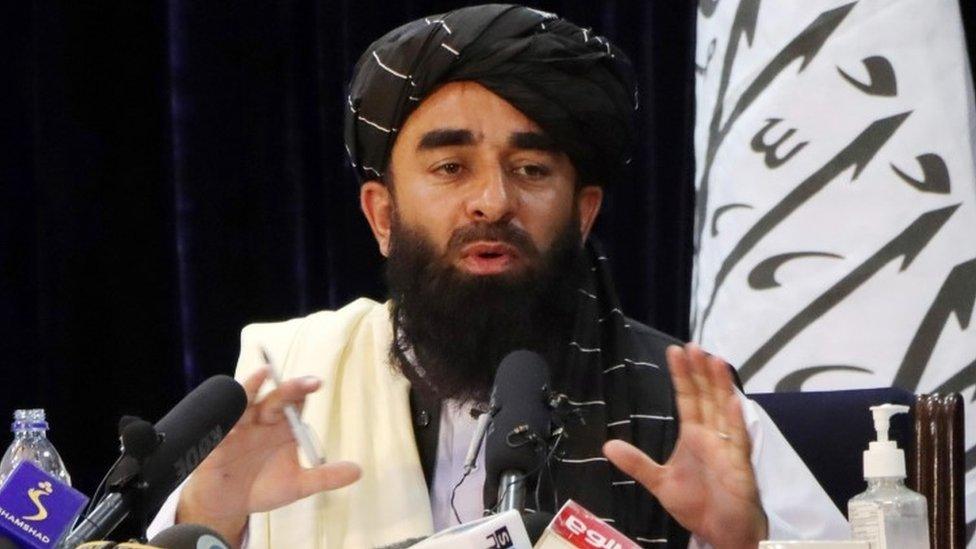Afghanistan: Mysterious Taliban spokesman finally shows his face
- Published

Zabihullah Mujahid answered questions at the historic news conference
When the Taliban delivered their first news conference since seizing control of Afghanistan on Tuesday, spokesman Zabihullah Mujahid was doing most of the talking.
Mr Mujahid fielded a wide-range of questions from reporters in the historic press conference, in which he claimed that the rights of women would be respected "within the framework of Islamic law".
For most journalists watching, something else was also significant: it was the first time they had seen his face. For years he has operated in the shadows, only a voice on the end of the phone.
The BBC's Yalda Hakim says she was "shocked" to see the face of a man she had been speaking to for more than a decade, answering the first question from a female journalist.
The spokesman sought to strike a tone of conciliation, telling another reporter: "We don't want any internal or external enemies."
But Ms Hakim says this is a far cry from some of the messages she used to receive from him.
"Some of these texts were hardcore Islamist texts. Some of those you think: 'This guy is bloodthirsty for the Americans, he's bloodthirsty for anyone in the Afghan government.' Then today he sits there and says there will be no reprisals," she says.
"For years he has sent out these bloodthirsty statements and now he's suddenly peace loving? It's hard to reconcile."
Taliban spokesman: "We will not allow the soil of Afghanistan to be used against anyone"
In fact Mr Mujahid was sitting in the seat which until recently belonged to Dawa Khan Menapal, the director of Afghanistan's media and information centre, who was assassinated by Taliban militants earlier this month.
Mr Mujahid claimed responsibility at the time and said Mr Menapal "was killed in a special attack".
Many other reporters have been tweeting about witnessing Mr Mujahid, including veteran BBC journalist, John Simpson, who called him "a relatively moderate, pleasant man".
Allow X content?
This article contains content provided by X. We ask for your permission before anything is loaded, as they may be using cookies and other technologies. You may want to read X’s cookie policy, external and privacy policy, external before accepting. To view this content choose ‘accept and continue’.

Allow X content?
This article contains content provided by X. We ask for your permission before anything is loaded, as they may be using cookies and other technologies. You may want to read X’s cookie policy, external and privacy policy, external before accepting. To view this content choose ‘accept and continue’.

But for years there has been speculation as to whether the faceless spokesman might actually be more than one person.
Lyse Doucet, the BBC's chief international correspondent, said these discussions were going on long before the days of social media, when reporters had to call him on a landline. Some have suggested that the man sitting in front of the cameras on Tuesday looked too young to be the same person fielding questions for all those years.
"There has been speculation for years that it was a made up name, that there were many "Zabihullahs" who took turns. Now of course we are all accepting this is THE Zabihullah Mujahid. Maybe he isn't?" Ms Doucet says.
Ms Hakim says the mystery is all part of the Taliban playbook.
"That's what the Taliban are, they're organised and ideological - nothing is done by accident. To create mystery around a single person, suddenly he appears on screen - you couldn't write the script better," she says.
Regardless whether Mr Mujahid is one person or not, Ms Hakim says she was wary of his words on Tuesday despite his efforts to appear measured.
"The caveat was really the sharia law - that sent chills down my spine," she says. "They still haven't laid out what that looks like."
"That's the thing with the Taliban - they're deceptive, they're charming, they know how to use the right language, but you're never quite sure whether you should believe them or not," she says.
"There is a lot of mystery ... but do we really know who they are?"